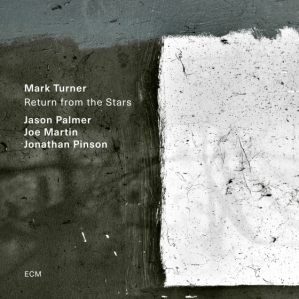Mark Turner – Return from the Stars (CD Review)
Mark Turner
Return from the Stars
Mark Turner, saxophone; Jason Palmer, trumpet; Joe Martin, double-bass, Jonathan Pinson, drums
ECM Records
In recent years, saxophonist Mark Turner has appeared as a collaborator on a number of ECM recordings, including CDs with Billy Hart and Ethan Iverson. His latest, Return from the Stars, is the first quartet outing he has recorded for the label as a leader since 2014’s Lathe of Heaven. The players who join Turner are trumpeter Jason Palmer, bassist Joe Martin, and drummer Jonathan Pinson. All of the tunes are originals by Turner, and he demonstrates versatility and depth as a writer. Just as Lathe of Heaven is the name of an Ursula K. LeGuin novel, Return from the Stars references a totemic sci-fi book by Stanislav Lem. There are no electronics or sci-fi effects that suggest spaciness, but the solos of the winds and freely flowing rhythm section suggest music that aloft ascends.
The title composition has a mysterious cast, beginning with the tune outlined by trumpet and saxophone with heterophonic embellishments in both of the winds and a sotto voce rhythm section. The lines start to crisscross only to once again converge, with Martin interjecting a walking line that supplies another melody to the action. Pinson builds upon Martin’s gestures, swelling to dynamic presence. Turner is a generous collaborator, eager to showcase his colleagues alongside his own playing. Palmer is allowed considerable time to solo. His rangy and rhythmically varied one on “It’s not Alright” is a particular standout of virtuosity and taste in shaping numerous choruses. The tune also features Turner and Palmer playing fleet renditions of the tune in octaves completely together. On “Wasteland” they play a duet in rhythmic unison but in constantly shifting intervals. Martin and Pinson relate to them in an abstract fashion. Just when you think that they are off on a tangent, the group syncs together, with Martin providing harmonic underpinning and Pinson landing with him to articulate arrival points.
Several of the tunes stretch, but “Unacceptable” is the longest form, with cat-and-mouse canons leading off into overlapping winds. A melodic cell is played in intervals and then developed as a principal motive in octaves. The winds submerge at their cadences points, affording space for breaks by the rhythm section followed by solo turns. Turner’s is chromatic, vibrant in tone, and filled with scalar passages that develop and recall the chorus. The game of canons returns, followed by a languid trumpet solo and then a warm wind duet. The close is a beautiful denouement, with the wind duo slowing down and fading to pianissimo and the rhythm section equally hushed.
An intricate piece, “Unacceptable” suggests that Turner would do well to arrange some of his compositions for larger ensembles: perhaps ECM will oblige in a future recording project. In the meantime, Return from the Stars supplies the listener with plenty of fascinating music to savor.
-Christian Carey
